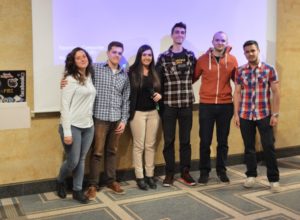Tag: developers
Find out how the software industry is changing the world at...
The next massive digital transformation of the world economy will be led by a perfect storm of several different, but equally important trends in the software industry. Open source development, machine learning and artificial intelligence, changing infrastructure and customer-first design all have the power to be game-changers and to transform the world we live in.
This combination will create new opportunities for startup creation and industry disruption. The process will put additional pressure on the already established enterprises to abolish the older technology and reinvent themselves.
One of the common things between the main industry disruptors nowadays is the use of open code software and still managing to monetize their ideas. The other is that they all perceive their businesses as software based.
Webit has always been all about the future of enterprise and policy-making. That is why on this edition of Webit.Festival we have invited top experts in the software development industry. During the Dev Summit will share their experience on topics, such as what is DevOps, how can you streamline and automate Ops, Agile & DevOps, Boosting developers productivity with DevOps and managing deployments and infrastructure with DevOps.
The Founder and CTO of MariaDB Foundation and Founder of MySQL AB Michael “Monty” Widenius will explain to the audience how to make money from open source software.
Google’s Developer Advocate Don Dodge will talk about the current state of Machine Learning at one of the biggest corporations in the world, where it is already been used in products people use every day.
The Developer Evangelist at Amazon Peter Heinrich will speak about the millions of downloads and in-app purchases Amazon processes every year and what are the three monetization secrets of the top mobile apps.
Hired’s Founder and CTO Allan Grant will share his thoughts about the secrets of starting a marketplace company, its building and maintaining. He will give the audience advices on the user targeting and methods for creating a sustainable community.
The Founder and Chairman of Pocket App Paul Swaddle will speak about the expected growth in enterprise mobile app development, as business focus on “mobilising” their workforce to improve productivity, business efficiency and customer service.
Meanwhile, the CTO of TapOnIt Tsahi Liberman will explain what are the emerging business models of children games and how to teach our kids about peace and tolerance using them.
Here you can see a full list of the confirmed speakers at Webit.Festival, while here you can get all the information you need about the tickets for the event.
Is automation the developer’s nightmare or a much needed help
The fourth industrial revolution has already led to transformations that alter our way of life fundamentally. But perhaps the most important of them all is the change in the labour market, which affects hundreds of jobs and can become a challenge even for the most sought ones - the developers.
Recent study, conducted by the Oxford University, showed that 47% of jobs in the United States are at risk of being automated in the next two decades. But according to McKinsey Global Institute, only 5% of all occupations are at risk of being entirely automated.
Rather than disappearing, the report’s authors say, jobs will change dramatically, forcing workers to adapt. McKinsey’s analysis of 800 occupations and 2,000 job tasks predicts that half of workers’ current tasks could be automated by the year 2055 using technology that currently exists.
The experts think that those changes will not lead to mass unemployment. Instead, the automation could increase global productivity by 0.8% to 1.4% annually over the next 50 years.
Those jobs are not only in the manufacturing sector, where robots will soon be doing almost every task. Today we can see the automation slowly taking over many white collar occupations, and this is just the beginning.
Industry data show that enterprises are investing more money in platforms, tools and automated processes and less in manual professional services. Eventually experts predict that robots or robo-software will replace developers and will prove to be the only solution able to support the increasing demand.
The CEO of Zuznow mobile development platform Chen Levkovich told Venture Beat that while many developers oppose automation, the new tools can help them become more efficient.
Last November Forbes reported that the custom software development company Dev9 is using artificial intelligence to eliminate strenuous processes and drastically reduce manual overhead.
Using teams of 3 to 8 people, with expertise ranging from architecture, development, project management, quality and deployment, Dev9 develops original technology that rapidly, reliably and repeatedly pushes software enhancements and bug fixes to customers at a low risk.
To learn more about the future of software development and DevOps, join the Dev Summit within Webit.Festival. On the scene you’ll see and hear top level speakers, such as the Founder and CTO of Maria DB Foundation Michael “Monty” Widenius, the Founder and CTO of Hired Allan Grant, and the Developer Evangelist in Amazon Peter Heinrich.
How can we make money from Open Source software
In recent decades globalization unfolded as a process that has brought huge positives for the freedom of trade, travel and cultural exchange in the world. But in terms of informational technology the main part of its success is reflected in the development of Open Source software.
Until recently, many people thought that the use of open source is something unique to non-profit organizations. But major companies, including Oracle and Google, support this kind of software too.
According to industry estimates, more than 180 young companies that give away their software, raised roughly $3.2 billion in financing from 2011 to 2014. This is amazing shift from the time when ex-Microsoft CEO Steve Ballmer called Linux a cancerous operating system.
Here are some of the top business models for profiting from open source:
Redistributing Open Source Code
Perhaps the most popular way to make money from the open source is to take free code, that is written elsewhere and to try to sell it in value-added form.
But the fact your company is not the only one, that is developing the software, makes it harder to sell to the customers.
Companies paying for Open Source programming
It is hard to believe, but there are many companies paying developers to create open source software platforms. Some of the biggest among them are Red Hat, IBM, Novell and Linux Foundation. And there are many other distributors of Linux that want to upgrade and patch the already existing software.
Freemium model
This model is based on the idea of building an open source product and allowing free use of the code, but not for enterprise and value-added products. Freemium is simple and straightforward, but many are criticizing it for pushing users toward the enterprise editions of the free versions.
Selling Service
The financial return of costs on open-source software can also come from selling services, such as training, technical support, or consulting, rather than the software itself.
Another possibility is offering open-source software in source code form only, while providing executable binaries to paying customers only, offering the commercial service of compiling and packaging of the software.
If you want to keep up with the hottest trends in the world of software development Webit.Festival is the right place for you. During the Dev Summit, you can listen to top level speakers such as the Founder and CTO of Maria DB Foundation Michael “Monty” Widenius, the Developer Advocate at Google Don Dodge, and the Developer Evangelist at Amazon Peter Heinrich.
Technology has no gender – Sheree Atcheson of Women Who Code...
 Women Who Code is a global non-profit organization dedicated to inspiring women to excel in technology careers by creating a global, connected community of women in technology. WWC was founded in 2011 and has since grown to 50,000 members spanning 20 countries. Women Who Code creates an avenue for women in tech by hosting free meetups around the world, and showcases the amazing careers that it can provide-especially to young girls.
Sheree Atcheson is UK Expansion Director of WomenWhoCode. Here is the recent talk that we had with her, sharing thoughts on what it is to be a girl in tech and what it takes to change the stereotypes:
WEBIT: Speaking the facts, is it the IT world man's territory or not anymore? What transformation have you witnessed for the years as director of Women Who Code?
Sheree: As the UK expansion director of women who code, I've witnessed the change in shift from when I started this outreach 3-4 years ago. I don't believe IT is a mans territory - it is anyone's territory who wishes to take it and make it into something. In the past years, I have worked with local governments, worldwide companies and huge businesses who have all been interested in ensuring there is no "gender specific territory" in this industry. The existence of these people is exactly the kind of shift we need.
WEBIT: What could be done to motivate more girls to get interested in technology?
Sheree: The age old question. It's a very difficult and detailed problem to try and combat gender stereotypes which have been instilled in parents, teachers and the toy industry. When the majority of toys (from newborn onwards) are targeting girls with pink frilly princess themed toys and boys with blue trucks/engineering toys then we have a lot of work to ensure that those stereotypes do not stop either gender from believing they can and can't do certain things. Thankfully due to goldieblox, Lego and Lottie dolls, we're working to prevent the issue in its very first form.
Women Who Code is a global non-profit organization dedicated to inspiring women to excel in technology careers by creating a global, connected community of women in technology. WWC was founded in 2011 and has since grown to 50,000 members spanning 20 countries. Women Who Code creates an avenue for women in tech by hosting free meetups around the world, and showcases the amazing careers that it can provide-especially to young girls.
Sheree Atcheson is UK Expansion Director of WomenWhoCode. Here is the recent talk that we had with her, sharing thoughts on what it is to be a girl in tech and what it takes to change the stereotypes:
WEBIT: Speaking the facts, is it the IT world man's territory or not anymore? What transformation have you witnessed for the years as director of Women Who Code?
Sheree: As the UK expansion director of women who code, I've witnessed the change in shift from when I started this outreach 3-4 years ago. I don't believe IT is a mans territory - it is anyone's territory who wishes to take it and make it into something. In the past years, I have worked with local governments, worldwide companies and huge businesses who have all been interested in ensuring there is no "gender specific territory" in this industry. The existence of these people is exactly the kind of shift we need.
WEBIT: What could be done to motivate more girls to get interested in technology?
Sheree: The age old question. It's a very difficult and detailed problem to try and combat gender stereotypes which have been instilled in parents, teachers and the toy industry. When the majority of toys (from newborn onwards) are targeting girls with pink frilly princess themed toys and boys with blue trucks/engineering toys then we have a lot of work to ensure that those stereotypes do not stop either gender from believing they can and can't do certain things. Thankfully due to goldieblox, Lego and Lottie dolls, we're working to prevent the issue in its very first form.
 As for getting girls interested in GCSE and A LEVEL engineering modules, we need to ensure they are always given the opportunity and that teachers are well informed. More often than not, careers teachers are not aware of how vast and lucrative the tech industry is, and if they are not aware, there is a trickle down effect which means the parents don't know and therefore they steer their children elsewhere.
WEBIT: What are the biggest changes we can foresee in terms of female and male engagement in the IT sphere?
Sheree: We have already seen big shifts, with organisations like women who code growing to over 50,000 members. This kind of change is no coincidence and it's happening because people are interested in making a change. We host weekly and monthly events all over the world, for free, and we're able to do this because of the large number of people wanting to help change this industry for the better.
WEBIT: Have you ever been discriminated or underestimated as female engineer?
Sheree: I was a software engineer for approx 3 years. Now I am a product analyst for market data feed handler technology. I have been very lucky to have not experienced some of the horror stories I have heard of from other women. I have had inappropriate comments made about my appearance and how that somehow is why I have been relatively successful - those kinds of comments directly undermine the hours and hours of work I have put into my outreach career (whether or not that's the original aim for the comment is irrelevant, it's not acceptable).
WEBIT: Chicago was the first city to make computer science a core subject, required for graduation. Do we need to close the gap between male and female coders early in school?
Sheree: Yes. 100% yes. As I said above, these issues stem from a very young age. The quicker we can work with children to highlight the benefits of the tech industry, the better. We at Women Who Code actively work with schools all over the world to showcase local role models to young girls so they don't fall into the "you can't be what you can't see" mentality. They will be able to see what they can accomplish, if this is the career they're interested in.
WEBIT: GitHub is one of the largest open-source software communities in the world. A recent research (based on approximately 3m pull requests) found that code written by women was approved at a higher rate (78.6%) than code written by men (74.6%). “Women’s acceptance rates dominate over men’s for every programming language in the top 10, to various degrees,” the researchers found, but only if the gender was not disclosed.
Possible explanation: May be women just need to work very hard to prove their skills in female-unfriendly environment?
Sheree: It's very hard to pin point to definitive reasoning for this, but from the statistics, it can show that the quality of the women's code is better. I believe the quality of a coder cannot be broken down into "women vs men" (not all men are good coders and neither are all women), but needs to be looked at on a case by case basis.
WEBIT: Sarah Lacy, the founder of Pando wrote an article describing disturbing issues on why the VC’s hesitation to fund women start at home. Responding, Sarah Nadav, who is entrepreneur, economist and journalist published a screenshot of conversation she had with a manager of a major VC:
As for getting girls interested in GCSE and A LEVEL engineering modules, we need to ensure they are always given the opportunity and that teachers are well informed. More often than not, careers teachers are not aware of how vast and lucrative the tech industry is, and if they are not aware, there is a trickle down effect which means the parents don't know and therefore they steer their children elsewhere.
WEBIT: What are the biggest changes we can foresee in terms of female and male engagement in the IT sphere?
Sheree: We have already seen big shifts, with organisations like women who code growing to over 50,000 members. This kind of change is no coincidence and it's happening because people are interested in making a change. We host weekly and monthly events all over the world, for free, and we're able to do this because of the large number of people wanting to help change this industry for the better.
WEBIT: Have you ever been discriminated or underestimated as female engineer?
Sheree: I was a software engineer for approx 3 years. Now I am a product analyst for market data feed handler technology. I have been very lucky to have not experienced some of the horror stories I have heard of from other women. I have had inappropriate comments made about my appearance and how that somehow is why I have been relatively successful - those kinds of comments directly undermine the hours and hours of work I have put into my outreach career (whether or not that's the original aim for the comment is irrelevant, it's not acceptable).
WEBIT: Chicago was the first city to make computer science a core subject, required for graduation. Do we need to close the gap between male and female coders early in school?
Sheree: Yes. 100% yes. As I said above, these issues stem from a very young age. The quicker we can work with children to highlight the benefits of the tech industry, the better. We at Women Who Code actively work with schools all over the world to showcase local role models to young girls so they don't fall into the "you can't be what you can't see" mentality. They will be able to see what they can accomplish, if this is the career they're interested in.
WEBIT: GitHub is one of the largest open-source software communities in the world. A recent research (based on approximately 3m pull requests) found that code written by women was approved at a higher rate (78.6%) than code written by men (74.6%). “Women’s acceptance rates dominate over men’s for every programming language in the top 10, to various degrees,” the researchers found, but only if the gender was not disclosed.
Possible explanation: May be women just need to work very hard to prove their skills in female-unfriendly environment?
Sheree: It's very hard to pin point to definitive reasoning for this, but from the statistics, it can show that the quality of the women's code is better. I believe the quality of a coder cannot be broken down into "women vs men" (not all men are good coders and neither are all women), but needs to be looked at on a case by case basis.
WEBIT: Sarah Lacy, the founder of Pando wrote an article describing disturbing issues on why the VC’s hesitation to fund women start at home. Responding, Sarah Nadav, who is entrepreneur, economist and journalist published a screenshot of conversation she had with a manager of a major VC:
 What is your advice to young girls, who will face discrimination or arrogant behaviour?
Sheree: There are arrogant people in every walk of life and you will 100% come across them. My advice is to always be aware of someone like this and never let them devalue your work or opinions. Also be cautious of yourself, never become that arrogant person and always try to remember how much hard work you had to put into your career to get it where it is now - you're the leader now and it's your turn to help the next generation be as awesome as you are.
You can meet Sheree at WEBIT.FEST'16 and listed to her talk on the stage of the Dev Summit.
Tickets prices increase with 30% from April 1st, so hurry up and book your access to the festival.
What is your advice to young girls, who will face discrimination or arrogant behaviour?
Sheree: There are arrogant people in every walk of life and you will 100% come across them. My advice is to always be aware of someone like this and never let them devalue your work or opinions. Also be cautious of yourself, never become that arrogant person and always try to remember how much hard work you had to put into your career to get it where it is now - you're the leader now and it's your turn to help the next generation be as awesome as you are.
You can meet Sheree at WEBIT.FEST'16 and listed to her talk on the stage of the Dev Summit.
Tickets prices increase with 30% from April 1st, so hurry up and book your access to the festival. WEBIT.FOUNDATION award to young developers #devsummit
WEBIT.FEST's Dev Summit takes place on April 20th in Sofia Tech Park, welcoming speakers from three continents. Part of the lineup has been already announced, including MySQL, WomenWhoCode, Angelhack, Google, Twilio and many others.
Except good content, there is something else that we value and it is talent, tech spirit and entrepreneurship. WEBIT.FOUNDATION was created to support and motivate young people in their career.
We are happy to award the two winning teams of the Hack Bulgaria latest contest and to provide them with free tickets for the Dev Summit, where they can find further inspiration and opportunities.
Meet the winners and their ideas!
Team Underdogs made a web application for teachers notebook, which helps communication between teachers, students and parents.
Team Catchy made online store that can be easily added to a blog plugin, so people without technical skills can have their own online store.
The registration and pass booking is still available on our official webpage till 10th of April. The agenda of 19th and 20th includes also Marketing and Innovation Summit, Tech Summit, Smart Cities Summit, New Economy Leadership Summit, Investors Day and Startup Pitches, Trade and Startup Expo, Night Summit with cultural agenda, WEBIT party on Day1 and Startup party on Day2, 50 meetups on different topics - all of this you can check at webit.bg.
See you at WEBIT.FESTIVAL!




